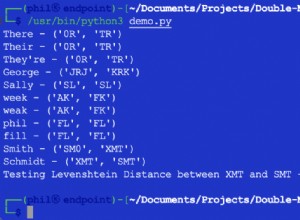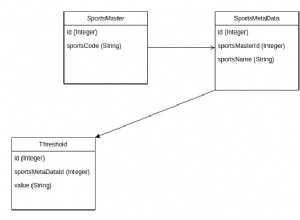- Wenn bei cx_Oracle Fehler auftreten, ist es wahrscheinlich am besten, diese in einer Textdatei zu protokollieren.
- Sie könnten versuchen, sys.stdout und sys.stderr auf dateiähnliche Objekte umzuleiten, die alles, was in sie geschrieben wird, in einem Logger protokollieren.
- Ich würde vermuten, dass Sie sich nach jedem Ereignis verpflichten möchten, es sei denn, Sie haben triftige Gründe, dies nicht zu tun. Alternativ können Sie mehrere Ereignisse zwischenspeichern und alle so oft in einer einzigen Transaktion schreiben.
- Unten ist ein Beispiel, das mx.ODBC verwendet, Sie können dies wahrscheinlich ohne allzu großen Aufwand an cx_Oracle anpassen. Es soll Python DB-API 2.0-kompatibel sein, denke ich.
Die eigenständige Python-Protokollierungsdistribution (bevor die Protokollierung zu Python hinzugefügt wurde) ist unter https://www.red-dove.com/python_logging.html zu finden, und obwohl das Protokollierungspaket in Python viel aktueller ist, enthält die eigenständige Distribution einen Test Verzeichnis, das viele nützliche Beispiele abgeleiteter Handler-Klassen enthält.
#!/usr/bin/env python
#
# Copyright 2001-2009 by Vinay Sajip. All Rights Reserved.
#
# Permission to use, copy, modify, and distribute this software and its
# documentation for any purpose and without fee is hereby granted,
# provided that the above copyright notice appear in all copies and that
# both that copyright notice and this permission notice appear in
# supporting documentation, and that the name of Vinay Sajip
# not be used in advertising or publicity pertaining to distribution
# of the software without specific, written prior permission.
# VINAY SAJIP DISCLAIMS ALL WARRANTIES WITH REGARD TO THIS SOFTWARE, INCLUDING
# ALL IMPLIED WARRANTIES OF MERCHANTABILITY AND FITNESS. IN NO EVENT SHALL
# VINAY SAJIP BE LIABLE FOR ANY SPECIAL, INDIRECT OR CONSEQUENTIAL DAMAGES OR
# ANY DAMAGES WHATSOEVER RESULTING FROM LOSS OF USE, DATA OR PROFITS, WHETHER
# IN AN ACTION OF CONTRACT, NEGLIGENCE OR OTHER TORTIOUS ACTION, ARISING OUT
# OF OR IN CONNECTION WITH THE USE OR PERFORMANCE OF THIS SOFTWARE.
#
# This file is part of the standalone Python logging distribution. See
# https://www.red-dove.com/python_logging.html
#
"""
A test harness for the logging module. An example handler - DBHandler -
which writes to an Python DB API 2.0 data source. You'll need to set this
source up before you run the test.
Copyright (C) 2001-2009 Vinay Sajip. All Rights Reserved.
"""
import sys, string, time, logging
class DBHandler(logging.Handler):
def __init__(self, dsn, uid='', pwd=''):
logging.Handler.__init__(self)
import mx.ODBC.Windows
self.dsn = dsn
self.uid = uid
self.pwd = pwd
self.conn = mx.ODBC.Windows.connect(self.dsn, self.uid, self.pwd)
self.SQL = """INSERT INTO Events (
Created,
RelativeCreated,
Name,
LogLevel,
LevelText,
Message,
Filename,
Pathname,
Lineno,
Milliseconds,
Exception,
Thread
)
VALUES (
%(dbtime)s,
%(relativeCreated)d,
'%(name)s',
%(levelno)d,
'%(levelname)s',
'%(message)s',
'%(filename)s',
'%(pathname)s',
%(lineno)d,
%(msecs)d,
'%(exc_text)s',
'%(thread)s'
);
"""
self.cursor = self.conn.cursor()
def formatDBTime(self, record):
record.dbtime = time.strftime("#%m/%d/%Y#", time.localtime(record.created))
def emit(self, record):
try:
#use default formatting
self.format(record)
#now set the database time up
self.formatDBTime(record)
if record.exc_info:
record.exc_text = logging._defaultFormatter.formatException(record.exc_info)
else:
record.exc_text = ""
sql = self.SQL % record.__dict__
self.cursor.execute(sql)
self.conn.commit()
except:
import traceback
ei = sys.exc_info()
traceback.print_exception(ei[0], ei[1], ei[2], None, sys.stderr)
del ei
def close(self):
self.cursor.close()
self.conn.close()
logging.Handler.close(self)
dh = DBHandler('Logging')
logger = logging.getLogger("")
logger.setLevel(logging.DEBUG)
logger.addHandler(dh)
logger.info("Jackdaws love my big %s of %s", "sphinx", "quartz")
logger.debug("Pack my %s with five dozen %s", "box", "liquor jugs")
try:
import math
math.exp(1000)
except:
logger.exception("Problem with %s", "math.exp")




